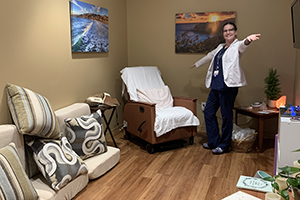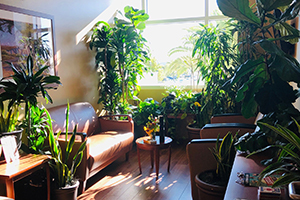Rising to the Call
April 16, 2020
Sarah Phillips, a registered nurse, is a critical care unit clinical educator at Marian Regional Medical Center in Santa Maria, California. She and her colleagues are caring for many patients with COVID-19. Phillips switched from days to the overnight shift as COVID-19 patients began coming to Dignity Health's Marian Regional. (Dignity Health is part of CommonSpirit Health.) Her shifts in recent weeks have often stretched well beyond 12 hours.
Phillips talked to Catholic Health World's Lisa Eisenhauer about being in a front-line, lifesaving role in the pandemic and how she and her colleagues are coping with the stress level. To give intensive care unit clinicians a mental break during their grueling shifts, she turned two small family waiting rooms (emptied by the no-visitors policy) into staff "relaxation rooms." Here, in her own words, she underscores the imperative for clinicians to practice self-care to keep up the breakneck pace:
I've been with Dignity Health's Marian Regional Medical Center for almost eight years now. Just recently, I was able to transition into critical care, which is where my heart and soul is, and I've been there since January. I got to jump in, get my bearings a little bit and start COVID care.

Sarah Phillips, a critical care unit clinical educator at Marian Regional Medical Center in Santa Maria, California, invites attention to the comfy massage chair and other amenities in one of the two relaxation rooms she created at the hospital for nurses, respiratory therapists, doctors and others treating the sickest COVID-19 patients.
As a critical care educator, I support the staff in the department with any of their educational needs. I am also a facilitator for our new hires, new grads that enter our RN residency program. I also help develop workflow processes for the nurses and I'm hands-on at the bedside with them.
We prepared a specific unit for our COVID-positive patients and for our pending test results patients. We have quite a few COVID patients right now in ICU. We have isolation rooms and we have been doing a lot of cross-training with nurses so we can have more resources and more support when taking care of these patients — they require a lot of extra care — and then just making sure that we're properly putting on our protective equipment. There's a constant influx of new procedures and new processes for caring for these patients that varies from our normal workflow. That's been very stressful on us as nurses and as administrators and leaders.
I'm always there at night with the staff. Some of them are more junior nurses, a little less experienced overall with ICU. Some of them have been on the unit for a couple of years or even less. They really appreciate having that extra support and keeping the continuity of workflow and processes and safety and then mental and emotional support, too.
Our patients are very sick and it's scary and it's hard on us emotionally. These people are in there alone. Even though as professional health care providers we are there and providing them support and companionship and listening to them and being there for them, it's not the same as having your loved ones. And, of course, it's never easy to lose a patient to any disease process, but it's just that little extra harder now because of the nature of the illness and the restrictions that are a part of it.

Natural light, an abundance of plants and a bubbling fountain help care givers unwind in the nature relaxation room. Phillips converted a family waiting room into a retreat where ICU staff can recharge during shifts that are emotionally, mentally and physically demanding.
We just really want our nurses to be able to focus on being the best IC nurses and provide that excellent care that they always do, without having to worry about all the other elements that surround this pandemic. That's why I created the relaxation rooms, so they could step out of that chaos and changing environment and take a breath. It's like you've left the hospital, you've left your work environment for a moment and you've stepped into something that elicits calmness and quietness. It allows the nurses to realign themselves and refocus and be refreshed.
I created one room that has dim lighting, an aroma therapy station and a massager for your neck and shoulders. There's another chair that has a massager for your back and a foot massager. There's yoga mats. There is some inspirational reading material and quotes. There's beautiful pictures of our central coast area that were donated by a local photographer. There's a sound machine that provides sounds like a rainforest or a waterfall or the ocean. It's not just for nurses, the respiratory therapists and even the physicians or whoever needs to just take a moment, they can utilize that room.
For the other room, I collected as many plants as I could fit inside and created a couple of sitting areas. I put a fountain in there and there's some different activities to distract or to change what your mind is on, like an adult coloring book and there's a little puzzle, there's a journal to write your thoughts or words of encouragement or anything. And nurses and respiratory therapists and staff members, they like to go and just sit in there and breathe some of that fresh air and feel like they're surrounded by nature.
Whatever it is that you need spiritually, you can bring that into the rooms, whether it's within your heart or reading material. You bring whatever is your source of strength. That's the point of having the rooms, to be your sacred place to go to.
We have little door hangers that say "In use," so if they want to have the space to themselves, they can close the door and hang that on. Otherwise, there's room for maybe two or three people, but with the social distancing, I haven't seen multiple people using the rooms. It's meant to be individual use, but if you needed to sit and talk with somebody and get through whatever's bothering you or what's causing your focus to change, then there is that opportunity.
We have a third room where we have our spiritual care and chaplain and social workers available to talk to anybody who might be feeling distressed or anything. We're definitely focused on providing the mental health and the emotional support to our nurses and staff members when they need it.
It's been such a blessing to have the rooms. I love seeing the nurses when they come back, I can see it on their face. I can see it in their whole demeanor that they went into one of the rooms. They did self-care. That's what's going to build resiliency and that is what we need in the marathon of this pandemic and this changing health care environment that we're all in.
We're all very strong people by nature to even be in this kind of a professional field and so it just promotes more strength and resiliency.
We ideally will be able to create this space permanently someplace in the hospital because, of course, once everything goes back to whatever the new normal will be, we will have visitors back and they will need their space to wait for their family members.
I would say to the public that we caregivers are a force to be reckoned with and that this pandemic is not going to take us down. We are here answering the call of nursing, answering the call of respiratory therapy. We're all doing what we are meant to do. We're here to take care of those who are in the worst days of their lives. We're here to give them compassion and effective and safe healthcare and education and support. We're here, we're doing it and we're not going to quit.
Housekeeping staff has a pivotal role in protecting patients, hospital colleagues
April 7, 2020
Caprisha Lacy has been part of the environmental service team at Our Lady of the Lake Regional Medical Center in Baton Rouge, Louisiana, which is part of the Franciscan Missionaries of Our Lady Health System, since December. Lacy is among the team members who are cleaning rooms where patients with COVID-19 have gotten care.

Lacy
Before one of her recent shifts, she talked to Catholic Health World's Lisa Eisenhauer about being in a front-line role in helping to fight the pandemic. Here, in her own words, she describes how COVID-19 has changed her job duties and the pride she takes in her work:
In my job we have to thoroughly clean the rooms. For example, with the COVID positive rooms, we have to wipe everything down, including the walls, the ceiling, the cords from the machines. And with the linen, like the bed sheets and the clothes that patients had on in the hospital, all of those go inside a plastic bag, and then go inside of yellow bags to get washed separately, because it's basically biohazard. And everything that's inside the powder room, all of it goes into a biohazard bag. All of it goes in the trash.
It's pretty different than before COVID, because you have to make sure. I would rather stay in those rooms a longer time, because of the thing that's going on, just to make sure that everything is how it's supposed to be, completely cleaned for the next person. It's best to clean those rooms to a T.
With the COVID patients, once they're discharged and they're out of the room, we have to wait an hour before we can go in the room and clean it.
It takes probably about 45 minutes to 50 minutes, just to make sure that the room is completely clean. We use Virex 256 to kill the bacteria and stuff inside the room.
When doing this type of cleaning, we have to be in our personal protective equipment. We have to have our gloves and our gown that we put on over our scrubs. We have to have goggles, and we have to have face masks. We're pretty geared up, but you can wear the foot booties for your shoes, because we have to mop the floor. I decided to wear those. I still wipe my shoes off with bleach wipes.
I used to do surgical rooms at first, before my supervisor asked me to help him with the COVID-19 patients.
We can't go home without taking a shower after doing those types of rooms. Some areas, they don't have showers. So once we do those rooms, we have to completely take the contaminated shrubs off that we had on when we were doing the room, put them in a separate bag, and put it in a laundry chute, and then put on new scrubs, and go walk, and take your shower.
Before we even can enter the hospital, we have to be screened, as far as our temperature. They're going to ask about, "Have you been feeling any symptoms or anything?" They're trying to make sure we're good. At home, I make sure I wash my hands. I make sure I hand sanitize. I'm pretty cautious at all times.
I haven't gotten any information about any of my friends and family being sick. I have a big family, so for some people I may not know.
It's very good that the hospital doesn't turn anyone away, because nowadays some people will actually turn you away. I wouldn't want nobody to turn me away if I really needed help.
It feels amazing to be honest, to be called a hero because I always wanted to do something big in my life to help people, because I've always been that type of person. I've always helped people, whether they need it or not. It's just something that my mother taught me.
I would like the public to know that I am doing everything it is in my power that I can do to help out.